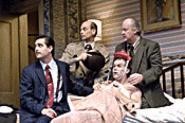It turns out that Room Service, the first offering of the season at the Cleveland Play House, is more lollipop than Tootsie Roll Pop -- offering lots of tasty treats, but without the satisfying center. This is mildly disappointing, since the Play House season crafted by artistic director Michael Bloom is studded with some exciting and even daring script selections. But the opener, a Broadway play by John Murray and Allen Boretz that was made famous in film by the Marx Brothers, depends on fast-twitch timing and the semicrazed pacing of a caffeine-addled chain-saw juggler. Instead, director Jeff Steitzer has fashioned a rather leisurely stroll through this frequently dated material, which drains a good bit of fun from the frolic.
It's 1937, and the White Way Hotel in New York City is home to producer Gordon Miller, who is trying to mount a production of Godspeed so that he can pay off his mounting bills. Those IOUs are accumulating at warp speed, since his entire cast of 21 actors is also bunking at the hotel, attacking the dining room like a herd of ravening wildebeests, and dropping it all on Miller's tab. Primary accomplices in Miller's folly are his director, the dyspeptic Harry Binion (played with gruff cynicism by Craig Bockhorn), and Miller's larcenous aide-de-camp, the appropriately monickered Faker Englund (an amusingly ferretlike Larry Paulse).
As in all farces, the numerous doors in Ursula Belden's handsome set are given a workout as actors, backers, creditors, and hangers-on cycle through Miller's room in search of fame, romance, fortune, or just a warm place to sleep. Even though many of the jokes are familiar ("Watch your language, there's a lady in the room," says someone, whereupon everyone turns to look, including the lady) and some of the topical references have faded into obscurity, there are enough comic situations to give supporting characters plenty of room to show their stuff.
True to so many films and plays of the 1930s, there are two sissy-man roles that generate laughs. As hotel manager Joseph Gribble (who's also the brother-in-law of Miller), Tom Beckett channels foppish and fidgety Franklin Pangborn as he tremblingly bounces between Miller's incessant scheming and the demands of his blowhard boss, Gregory Wagner (Allen Lewis Rickman, who almost literally manages to make steam come out of his ears in mid-rant). The second sissy is Simon Jenkins, the hefty but delicate envoy from a rich backer whose generous check may save the day. Mark Alan Gordon gives Jenkins a deliciously dainty air and then storms in later as rough-and-tumble Senator Blake.
Other entertaining performances are led by Greg Thornton, who is a hoot as the Russian room-service waiter and aspiring actor Sasha Smirnoff, giving a lustily overblown reading in an audition paid for by his rerouting of a dinner intended for another suite. As the young and innocent playwright of Godspeed, Joshua John McKay is a good-natured rube, and Ronald Thomas Wilson is properly curdled as the diminutive hotel sawbones Dr. Glass. In two small women's roles, Elizabeth A. Davis and Ivy Vahanian do all they can to add some feminine zing.
However, at the center of this constellation of wackos is Miller, a role played in the flick by Groucho and in this production by Todd Gearhart. Resembling a cross between Clark Gable and George Clooney, Gearhart has a handsome facade, but, unlike that aforementioned duo, is largely unexpressive and devoid of virtually any comic sensibility or ironic edge. Reciting his lines dutifully but without clear intent, he seems to be loitering in scenes his character should be steering. As a result, the farcical engine of the production sputters, and the sense of loopy desperation never builds as it should.
While he must be credited with helping to shape the smaller roles, director Steitzer seems to have left linchpin actor Gearhart to his own diminished devices. Steitzer has taken a similarly laissez-faire approach to the pacing of scenes and the crispness of physical business. While noses are bumped into walls and slammed by doors, the familiar shtick is not executed with the precision and spontaneity necessary to elicit big laughs. And a production can't soar to farcical greatness on the weak updrafts of silent smiles and occasional giggles.


